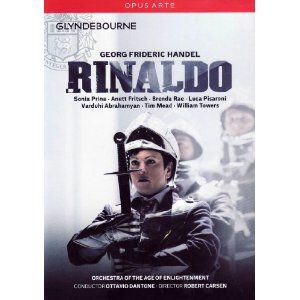This production, from Glyndebourne, is a pain in the neck. The plot is well-known: taking place during the First Crusade, the knight Rinaldo must choose between love and honor while fighting the forces of evil and sorcery, here personified by Armida (as in Rossini, Lully, and others) and Argante. Well, a hero is a hero, and in Robert Carsen’s comic take on the opera, we are in a school of what seems to be just pre-pubescent boys, one of whom, during a history lesson about the Crusades, imagines himself the knight Rinaldo and not the bullied nerd he apparently is. He has a crush on Almirena, a schoolgirl; a pair of teachers are Argante and Armida (the latter in leather/rubber dominatrix garb), and Armida’s Furies turn out to be nasty schoolgirls. The sets are by Gideon Davy: a classroom has a blackboard that turns into a stage/window on the world; a playground becomes a prison (unclimbable fence and all); a bike rack adds verisimilitude. Clever.
The underlying problem is that Rinaldo is not very funny, and so it wouldn’t matter if everyone were dressed as clowns—it still generates few laughs. Nowadays none of us really cares about Christians and Saracens of the Middle Ages, but we rarely chortle about them either. And if we are to take the love between Almirena and Rinaldo at all seriously, they can’t be little kids, not to mention the implications of Armida’s wild passion toward the youngster Rinaldo. Just because the relationships are presented with little depth—this opera is not, after all, Giulio Cesare, which probes the characters’ psyches—does not mean it is to be broadsided. And what are we to make of a stunning, sincere, deeply felt moment like “Cara sposa” when what surrounds it is frolicking? There are charming moments: when Rinaldo and his knights go off to battle they do so by bicycle, albeit still in their school uniforms.
Much of the singing is quite good. The always fine Sonia Prina lacks the coloring and power of some singers in the role—Horne, David Daniels, and to a lesser extent Vivica Genaux—but frankly, I can’t imagine that any of the others named would fill Robert Carsen’s concept the way she does, for better or worse. She looks and acts like a schoolboy, but contrarily, this holds her back from delivering tragic or amorous set pieces with real depth. But her singing, as such, is not to be faulted.
As Armida, Brenda Rae impresses in her entrance aria—an utterly loony, exciting piece—but her leather-bound, S&M portrayal actually gets in her way. Forced to act the wild woman, her singing occasionally follows suit and she loses pitch, focus, and accuracy. But I’d love to hear and see her again. Luca Pisaroni as Argante, with the only dark voice in the cast, is terrific; he dispatches coloratura as if it were easy, blends in his duets with Rae, and offers a mellow, warm legato later in the opera. Anett Frisch, a singer new to me, has the gorgeous “Lascia ch’io pianga” to sing as Almirena, which she does with lovely tone but little feeling. Perhaps having to play a schoolgirl, incapable of such grief, hampers her. Dark-toned Varhudi Abrahamyan makes the most of the trouser role of Goffredo, and Tim Mead is a strong Eustazio, despite an opaque countertenor sound. The Christian Magus, here portrayed as a strange science teacher with wild hair, is played and sung as a joke by William Towers.
Ottavio Dantone leads the Orchestra of the Age of Enlightenment with vivid colors but nowhere near the energy and sharp attacks and musical commentary of René Jacobs. In all, the direction strikes me as almost a send-up of the opera. It might work as such, but it shortchanges the music and the singers and we are left entertained by the show but hardly overwhelmed by one of Handel’s juiciest scores. The only other DVD of the opera is on Kultur in a production even worse than this one (modern dress; naked dolls; an Almirena dressed as a nun), but it does have David Daniels in the title role. This new one is better, if you must watch as well as listen. Otherwise, it’s Jacobs (HM) or Hogwood (Decca, with Daniels and Bartoli).
































